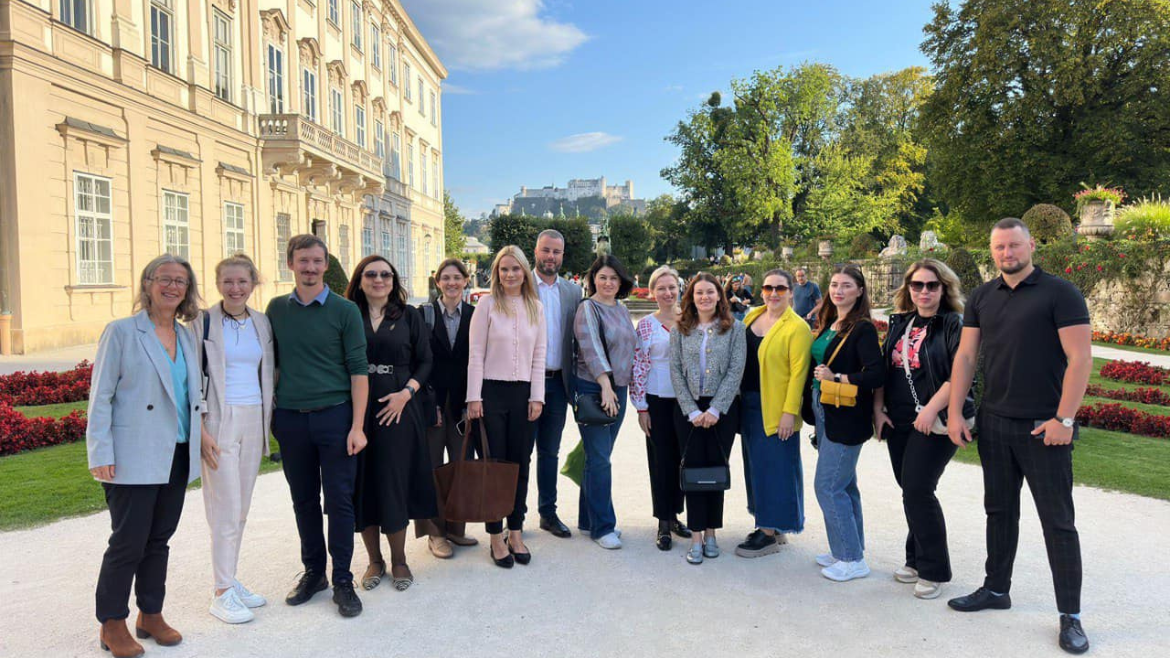During a five-day study visit to Austria, a delegation of Ukrainian representatives from both public authorities and civil society organisations discovered innovative and successful examples of citizen engagement mechanisms in Austria.
In the framework of the Council of Europe project “Strengthening democratic resilience through civic participation during the war and in the post-war context in Ukraine”, ten representatives from six pilot territorial communities were able to exchange with Austrian peers from municipalities and civil society to learn from good practices in the field of participatory democracy. Over four days, they visited four Austrian municipalities, where they discussed the use of various tools for engaging residents in decision-making processes.
The Ukrainian delegation began their study visit in the Vorarlberg region, Austria's westernmost part which is a pioneer in the institutionalisation of citizen participation. Since March 2011, Vorarlberg has conducted 13 regional Citizen Assemblies, reflecting the state's strong commitment to civic engagement, which is enshrined in the state constitution. In Bregenz, the capital of Vorarlberg, the delegation met with Gerald Sonderegger, President of the Land Parliament, who provided an overview of Austria's political system and the region's approach to citizen involvement. Michael Lederer, from the Office for Voluntary Engagement and Participation, highlighted the advantages of Citizens' Assemblies and other methods of engaging residents in addressing key municipal issues. The first day concluded with a visit to the district of Wolfurt, where Mayor Franziska Hattler and her colleagues presented the pilot launch of participatory budgeting, also showcasing their methods for citizen engagement through interactive activities.
The study trip continued in the City of Salzburg where municipal authorities have been implementing participatory processes to define the future of its urban development strategy in recent years. Following welcoming words from the City Councillor for urban planning, representatives of the Department of Spatial Planning presented their methods and experience in engaging citizens in the spatial planning of Salzburg. The group discussed with Austrian peers how best to combine different participatory mechanisms like youth expert council, citizen assembly and online survey to ensure that citizens of all sectors can be reached in a decision-making process.
The visit ended with a two-day visit to the Austrian capital Vienna. Participants were particularly interested in a presentation by the youth centre Wienxtra on the project "Participatory children and Youth Million". It empowers young people in Vienna to submit their ideas and decide themselves which of their projects will be implemented with 1 million EUR. Over its two-year duration, the project has hosted 700 events, reviewed 70 project proposals, and implemented 10 of them. It has successfully engaged 22,000 children and adolescents in the voting process, illustrating a powerful example of youth involvement in civic participation and decision-making.
At the Austrian Parliament, Ukrainian representatives gained valuable insights about the "Democracy Lab" workshop, an initiative by the Parliament aimed at familiarising young people from across Austria with national-level decision-making processes. Since its inception in 2007, the Democracy Lab has conducted 550 workshops, reaching over 12,000 children. This hands-on approach helps young citizens understand governance structures, encouraging civic engagement and participation at an early age.
Additionally, the Ukrainian delegation met with representatives of civil society organisations in Austria that focus on enhancing civic participation, such as the European Capital of Democracy, Faktor D, and Foster Europe. These organisations shared their successful initiatives and approaches to fostering citizen engagement, while the Ukrainian delegates contributed by sharing their own experiences in involving citizens in decision-making processes.
Another highlight of the Study Visit was the warm welcome in Ottakring, one of Vienna’s districts, where a big percentage of inhabitants do not have the right to vote, thus participation processes are the only way for them to voice their needs and visions. On this occasion, the Ukrainian guests learned about practical examples of citizen-steered projects to mitigate climate change. The Head of the Ottakring District discussed engaging local residents in spatial development projects and collaborating with Vienna’s "Climate Team". The team presented its initiatives on creating public spaces and climate adaptation strategies. A district tour highlighted ongoing projects, giving the Ukrainian guests a practical view of Vienna's efforts. The Ukrainian delegation also became familiar with the work of the Vienna Climate Council focusing on citizen participation and climate change.
The visit ended with the inspiring presentation of the Vienna Democracy Strategy, which is still being developed, a blueprint for ambitious initiatives in the field of civic participation, which led Vienna to be designated as European Capital of Democracy for the year 2025.
The Council of Europe project «Strengthening democratic resilience through civic participation during the war and in the post-war context in Ukraine» is designed to support the implementation of the objectives set out in the Council of Europe Action Plan for Ukraine «Resilience, Recovery and Reconstruction» (2023-2026) to strengthen the democratic processes and address the challenges public authorities are facing in the time of war and in post-war context through active and effective civic participation at the local, regional and national level.
Follow the news of the project on Facebook https://www.facebook.com/CivilParticipationPlatform







